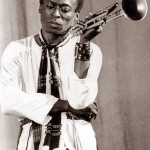 A few Fridays ago I was listening to Out to Lunch, WKCR’s weekday afternoon jazz program, as I try to do whenever I have the opportunity. Because Friday is the day I’m least likely to be listening, and because the DJs rotate from one day to the next, and some only work every other week, the voice on this Friday was unfamiliar to me. It was a female voice, a British voice; apparently, it was the voice that DJ’s every other Friday. I was at home, convalescing, or hoping I was convalescing, the process can be so slow, the body so unreliable. And this voice, it seemed better suited to a classical music program than to jazz … but of course it’s ridiculous to associate British accents with classical music, just as it would be to associate New York ones with jazz. The whole ethos of KCR would crucify me for such a prejudice—if, that is, one could be crucified by an ethos, and if it weren’t too ironic to be crucified for a prejudice.
A few Fridays ago I was listening to Out to Lunch, WKCR’s weekday afternoon jazz program, as I try to do whenever I have the opportunity. Because Friday is the day I’m least likely to be listening, and because the DJs rotate from one day to the next, and some only work every other week, the voice on this Friday was unfamiliar to me. It was a female voice, a British voice; apparently, it was the voice that DJ’s every other Friday. I was at home, convalescing, or hoping I was convalescing, the process can be so slow, the body so unreliable. And this voice, it seemed better suited to a classical music program than to jazz … but of course it’s ridiculous to associate British accents with classical music, just as it would be to associate New York ones with jazz. The whole ethos of KCR would crucify me for such a prejudice—if, that is, one could be crucified by an ethos, and if it weren’t too ironic to be crucified for a prejudice.
Anyway: I want to thank this DJ, whatever her name is, for playing Miles Davis, and nothing but Miles Davis, on this day, day of hoped-for convalescence. For playing songs from Walkin’, and Seven Steps to Heaven, and Miles in the Sky. New Miles, old Miles, Miles known and un-: I could think of nothing I’d rather have listened to. In the best possible way, and as he has in the past, Miles settled on me. I remember many years ago listening to Kind of Blue and sensing that there was an effortless perfection about Miles’s playing, and a sense of inevitability about his choices. Each note spoke the next one, which looked back upon the last, and which, somehow, could have been no other. And I was convinced of this, even as I understood that, at each moment, he could have chosen any other. And so I walked along with Miles, carried by him, expecting and not expecting each next note, each next note making so much sense that I couldn’t imagine it otherwise; listening, I couldn’t help but say yes, of course, that’s right, as if Miles had just proved to me that this note necessarily follows that one, and the next the next, with all the beauty and certainty of the simplest proofs of geometry. Miles told me there was noplace else to go. And that, in its small way, was comforting.
Miles settles and rolls, never strains or trembles, hoeing that straight, simple line (for a hoe in the hands of an experienced farmer is as expressive a tool as a jazzman’s horn). Wherever he moves—and he never really stops moving—he’s always at home. Such grace and poise and confidence, even in those growled motherfuckers. The result doesn’t sound like improvisation; it has more the feeling of sculpture; even as it unfolds in time, it has a spatial, plastic quality, as if, after he were done, you could hold the entire solo in your hands, turning it; or as if, while listening, you were walking not with but around it. You appreciate it as a whole, even though you can never hear it all at once. Sonny Rollins has been credited with introducing this sort of structural unity to the jazz solo. But I can’t imagine Rollins without Miles; there is the same seeming inevitability of choice about both men’s playing.
I’ve listened to a lot of Miles since that moment many years ago when I realized the above, listening to Kind of Blue, realized but never tried to say it; but I hadn’t really felt it again until this day—felt it and remembered that feeling, remembered what Miles is (as opposed to who he was). And that made me want to go on, and go back, and keep listening. So again, Ms. DJ, with your fine British accent and good taste, and with those vast archives at your disposal, whose name, in this age of the internet, I have chosen to let remain a mystery: thank you. A lot of music is a salve when you’re ill, but some is more salve than others. And then there’s some you just can’t be healed without. Miles fits the last category.



Pingback: Footenotes » Blog Archive » This Week on ‘Days of our Blogs’